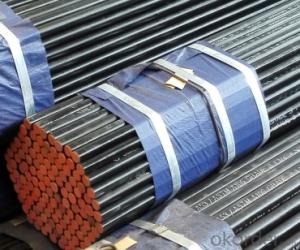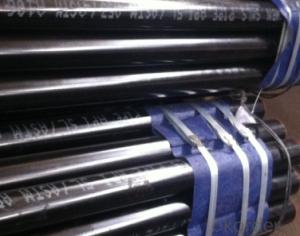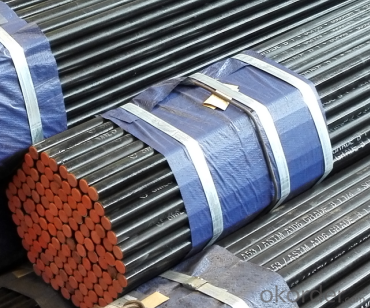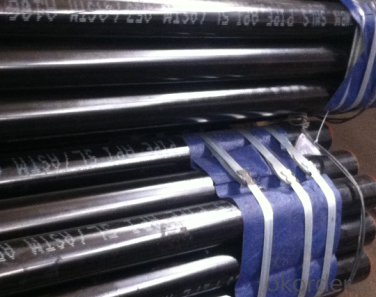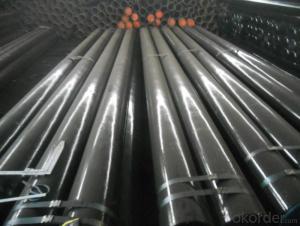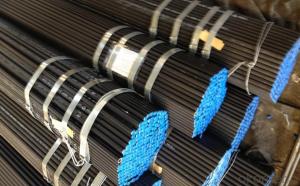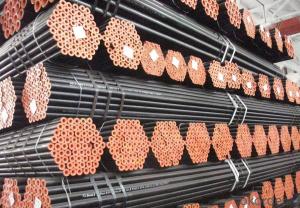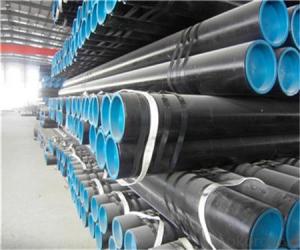CS SEAMLESS PIPE ASTM A53/ ASTM A106/ API 5L GR B
- Loading Port:
- Tianjin
- Payment Terms:
- TT or LC
- Min Order Qty:
- 25 m.t.
- Supply Capability:
- 2000 m.t./month
OKorder Service Pledge
OKorder Financial Service
You Might Also Like
1、Structure of CS SEAMLESS PIPE ASTM A53/ ASTM A106/ API 5L GR B:
Seamless pipe is formed by drawing a solid billet over a piercing rod to create the hollow shell.
As the manufacturing process does not include any welding, seamless pipes are perceived to be stronger and more reliable.
Historically seamless pipe was regarded as withstanding pressure better than other types, and was often more easily available than welded pipe.
2、Main Features of CS SEAMLESS PIPE ASTM A53/ ASTM A106/ API 5L GR B :
• High manufacturing accuracy
• High strength
• Small inertia resistance
• Strong heat dissipation ability
• Good visual effect
• Reasonable price
3、CS SEAMLESS PIPE ASTM A53/ ASTM A106/ API 5L GR B Specification:
Standard | GB, DIN, ASTM ASTM A106-2006, ASTM A53-2007 |
Grade | 10#-45#, 16Mn 10#, 20#, 45#, 16Mn |
Thickness | 8 - 33 mm |
Section Shape | Round |
Outer Diameter | 133 - 219 mm |
Place of Origin | He Bei, China (Mainland) |
Secondary Or Not | Non-secondary |
Application | Hydraulic Pipe |
Technique | Cold Drawn |
Certification | API |
Surface Treatment | factory state or painted black |
Special Pipe | API Pipe |
Alloy Or Not | Non-alloy |
Length | 5-12M |
Outer Diameter | 21.3-610mm |
Grade | 20#, 45#, Q345, API J55, API K55, API L80, API N80, API P110, A53B |
Standard | ASME, ASTM |
1) Material:20#(ASTM A 106/A53 GRB.API5LGRB,GB),45#,16Mn,10#.
2) Specification range:OD:21.3-610mm,WT:6-70mm,length:6-12m or according to the requirement of clients.
3) Excutive standards:GB,ASME API5L.ASTM A 106/A53,Despite of the above standards,we can also supply seamless steel pipe with standard of DIN,JIS,and so on,and also develop new products according to the requirements of our clients!
4) Surface:black lacquered,varnish coating or galvanized.
5) Ends:Beveled or square cut,plastic capped,painted.
6) Packing:bundles wrapped with strong steel strip,seaworthy packing.
4、Packaging & Delivery of CS SEAMLESS PIPE ASTM A53/ ASTM A106/ API 5L GR B
Packaging Details: | seaworthy package,bundles wrapped with strong steel strip |
Delivery Detail: | 30-45days after received 30%TT |
5、FAQ of CS SEAMLESS PIPE ASTM A53/ ASTM A106/ API 5L GR B :
①How is the quality of your products?
Our products are manufactured strictly according to national and internaional standard, and we take a test
on every pipe before delivered out. If you want see our quality certifications and all kinds of testing report, please just ask us for it.
Guaranteed: If products’ quality don’t accord to discription as we give or the promise before you place order, we promise 100% refund.
②How about price?
Yes, we are factory and be able to give you lowest price below market one, and we have a policy that “ for saving time and absolutely honest business attitude, we quote as lowest as possible for any customer, and discount can be given according to quantity”,if you like bargain and factory price is not low enough as you think, just don’t waste your time.Please trust the quotation we would give you, it is professional one.
③Why should you chose us?
Chose happens because of quality, then price, We can give you both.Additionally, we can also offer professional products inquiry, products knowledge train(for agents), smooth goods delivery, exellent customer solution proposals.Our service formula: good quality+good price+good service=customer’s trust
SGS test is available, customer inspection before shipping is welcome, third party inspection is no problem.
6、CS SEAMLESS PIPE ASTM A53/ ASTM A106/ API 5L GR B Images:
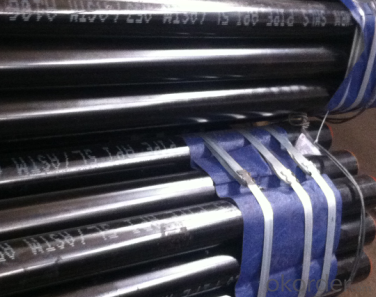
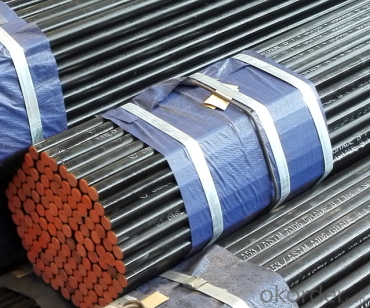
- Q: What are the common applications of steel pipes in the water distribution system?
- The common applications of steel pipes in the water distribution system include carrying potable water from the water treatment plants to homes and businesses, transporting water for irrigation purposes, and facilitating the flow of water in industrial processes. Steel pipes are often preferred due to their durability, resistance to corrosion, and ability to handle high water pressure.
- Q: What are the different types of steel pipe fittings for industrial applications?
- There are several types of steel pipe fittings commonly used in industrial applications, including elbows, tees, reducers, couplings, unions, flanges, and caps. These fittings are designed to connect, redirect, or control the flow of fluids in a piping system, ensuring efficient and reliable operation in various industrial processes.
- Q: How are steel pipes classified according to their wall thickness?
- Steel pipes are classified according to their wall thickness into various categories such as standard, extra strong, and double extra strong.
- Q: How do steel pipes perform in high-temperature environments?
- Steel pipes perform well in high-temperature environments due to their excellent heat resistance and thermal conductivity. The strength and structural integrity of steel pipes remain largely unaffected, making them ideal for applications such as steam lines, boiler tubes, and high-temperature industrial processes.
- Q: Can steel pipes be used for geothermal applications?
- Yes, steel pipes can be used for geothermal applications.
- Q: How are steel pipes classified based on their end connections?
- Steel pipes can be classified based on their end connections into three main categories: threaded, socket-weld, and butt-weld.
- Q: What are the different methods of pipe repair for steel pipes?
- There are several methods for repairing steel pipes, including spot repair, slip lining, pipe bursting, and pipe relining. Spot repair involves cutting out and replacing a small section of the damaged pipe. Slip lining involves inserting a smaller diameter pipe into the existing pipe to reinforce it. Pipe bursting involves breaking the old pipe while simultaneously installing a new one. Pipe relining involves inserting a liner into the damaged pipe and then curing it in place to create a new, seamless pipe within the existing one. The choice of method depends on the extent and location of the damage, as well as budget and time constraints.
- Q: How are steel pipes used in the manufacturing of hydraulic systems?
- Steel pipes are commonly used in the manufacturing of hydraulic systems due to their durability, strength, and resistance to high pressures. These pipes are typically used to transport hydraulic fluid, providing a reliable and leak-free connection between various components such as pumps, valves, and actuators. Steel pipes also offer the advantage of being able to withstand harsh operating conditions and ensure efficient fluid flow, making them an essential component in hydraulic system manufacturing.
- Q: What is the difference between steel pipe and concrete pipe?
- The main difference between steel pipe and concrete pipe lies in their material composition. Steel pipes are made from steel, which provides strength, durability, and resistance to corrosion. On the other hand, concrete pipes are made from a mixture of cement, aggregates, and reinforcing materials, offering advantages such as fire resistance and the ability to withstand high pressure. While steel pipes are commonly used for transporting fluids and gases, concrete pipes are often used in drainage and sewage systems.
- Q: Can steel pipes be used for air conditioning systems?
- Yes, steel pipes can be used for air conditioning systems. Steel pipes are commonly used in air conditioning systems for their durability, strength, and resistance to corrosion. They can effectively transport refrigerant and withstand the high pressure and temperature conditions involved in air conditioning operations.
Send your message to us
CS SEAMLESS PIPE ASTM A53/ ASTM A106/ API 5L GR B
- Loading Port:
- Tianjin
- Payment Terms:
- TT or LC
- Min Order Qty:
- 25 m.t.
- Supply Capability:
- 2000 m.t./month
OKorder Service Pledge
OKorder Financial Service
Similar products
Hot products
Hot Searches
Related keywords
